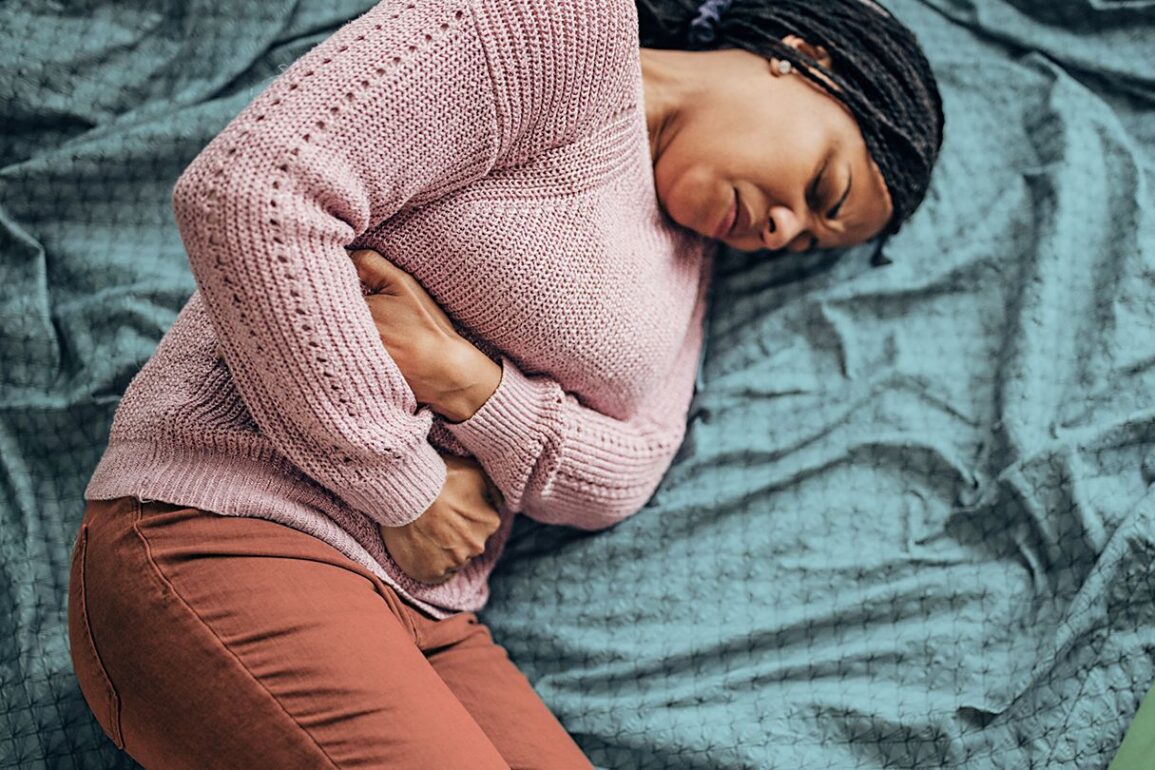
An estimated 1 in 10 women have endometriosis, an inflammatory condition in which endometrium, tissue that normally lines the inside of your uterus, grows in other places in the body.
Despite how common it is, women may suffer from endometriosis for 5 to 10 years before they receive a diagnosis, according to a study in the February 2023 Journal of Clinical Medicine, in part because there may be no symptoms, or the symptoms mimic those of other conditions.
Symptoms of endometriosis include:
- Severe pain during periods or sexual intercourse
- Abdominal bloating
- Nausea
- Fatigue
- Depression
- Anxiety
- Difficulty getting pregnant or infertility
An endometriosis diagnosis is even more challenging for Black women. A study published in January 2022 in the American Journal of Obstetrics & Gynecology found that Black women were 50 percent less likely to be diagnosed with endometriosis than white women.
That disparity is partly the result of a widely held misconception in the medical community that endometriosis is less common in Black people, says Paula Latortue-Albino, MD, an assistant professor of obstetrics and gynecology at Boston University Chobanian and Avedisian School of Medicine and an attending physician at Boston Medical Center.
“Unfortunately, this was rooted in flawed research [as described in an article in Reproduction and Fertility in April 2022] that included very few Black participants and did not take into consideration how biases in healthcare prevented or delayed the diagnosis of endometriosis in Black women,” says Dr. Latortue-Albino.
It’s now known that anyone can have the condition.
The most common risk factors for endometriosis are:
- A family member with endometriosis
- Never having been pregnant
- Retrograde menstruation, when monthly discharge that normally leaves the body through the vagina instead flows backward into the fallopian tubes, according to Yale Medicine.
Diagnosing endometriosis is also difficult because there are no blood tests that can detect it, and a physical exam or imaging may miss the signs.
Currently, the only way to make a definitive diagnosis is through laparoscopy, a surgical procedure.
To perform a laparoscopy, the doctor makes a small cut in the abdomen and inserts a thin tube with a light and a camera.
“We know that Black women’s pain is often minimized or dismissed by healthcare providers, and we know Black women experience more difficulty finding providers who take their symptoms seriously enough to offer more testing and even offer surgery to diagnose endometriosis,” says Latortue-Albino. “This is a big reason why we fail to diagnose endometriosis early on or at all,” she says.
What to Do if You’re Having Trouble Getting a Diagnosis
“At an individual level, Black women can educate themselves about endometriosis, and other gynecologic conditions that affect them disproportionately, including fibroids,” says Latortue-Albino.
Prepare for your doctor visit by bringing a menstrual calendar, a calendar of symptoms, and a list of questions for your provider, she says.
“Think about bringing someone you trust to your provider consultation who can help advocate for you, ask questions, and write notes. Ask for a pelvic exam and ask what additional testing your provider is ordering,” says Latortue-Albino.
If they are not doing any additional testing, ask them why, and when would they consider performing additional testing, or surgery to diagnose endometriosis, she says. “Also, consider seeking a second opinion or asking to see an endometriosis specialist,” adds Latortue-Albino.
Mark Lachiewicz, MD, MPH, a specialist in minimally invasive surgery, obstetrics, and gynecology who has conducted research on race and endometriosis, agrees that it may be necessary to seek out another doctor in some cases. “If you’re telling your doctor that you’re missing your work, or you’re missing school, and they’re not working to actively fix that problem, then you really need to be seeking another opinion, ideally from a doctor who has experience and is used to treating women with endometriosis,” he says.
“Black women may hesitate to seek a second opinion if they felt dismissed in their prior interaction with providers. It can be very hard to walk into a new clinic, with the fear of being dismissed again, says Latortue-Albino.
Sometimes obtaining a second opinion is not possible because the options may be limited within your health insurance network, and seeing an out-of-network provider may cost more, she says.
“Unfortunately, people using public health insurance may not have a choice in terms of where they are referred to for specialized care,” says Latortue-Albino.
People who seek a second opinion tend to be more educated with higher income or socioeconomic status and have private insurance, according to a review published in BMJ Open in August 2021. According to the authors, these findings “raise concerns about inequalities and access among deprived groups and those living in rural areas, where access to specialists is limited.”
How Endometriosis Is Treated
Endometriosis is a chronic condition, which means that once it is diagnosed, it’s present until menopause, says Latortue-Albino.
“Unfortunately, there is not a medication that will cure endometriosis,” she says. But there are things you can do to treat symptoms of the condition.
Hormonal medications Most cases of endometriosis are initially treated with hormonal medications that are also used for birth control, Latortue-Albino says. “These hormonal medications, such as birth control pills, patches, shots, or the hormonal intrauterine device (IUD), help suppress the hormonal changes that happen during menstrual cycles, decrease the growth of endometriosis, and make periods lighter and less painful.”
Medications that lower estrogen levels If hormonal medications aren’t enough to adequately treat endometriosis, there are medications called gonadotropin-releasing hormone agonists and antagonists which lower the levels of estrogen in the body, she says. “Because endometriosis is activated by estrogen, these medications can prevent its growth and even shrink endometriosis implants in the body,” says Latortue-Albino.
Surgery Surgery is sometimes needed to remove or burn endometriosis implants in the pelvis or endometriosis cysts in the ovaries, says Latortue-Albino. “In some cases, removing the uterus (a hysterectomy) is needed. In very severe cases that cannot be controlled otherwise, removing the ovaries in addition to the uterus is an option, but this is not common,” she says.
The medications mentioned above cannot be used while people are trying to achieve pregnancy, so treatment options can be limited when a person is trying to grow their family, notes Latortue-Albino.
Complementary Treatment Options for Endometriosis
“There is an emerging body of evidence that suggests complementary treatment strategies can improve the effectiveness of standard treatments,” says Dr. Lachiewicz.
These options include acupuncture, nutrition counseling, and physical activity, including yoga.
A small study published in January 2023 in Fertility and Sterility found that acupuncture helped with menstrual pain, well-being, and quality of life in women with endometriosis.
Women with endometriosis who practiced yoga twice a week for eight weeks had improvements in pain and intensity of bleeding, according to the findings of an April 2023 study published in Alternative Therapy Health Medicine.
Disparities in Endometriosis Care
These are topics that have not been studied enough, says Latortue-Albino. “From what we have learned about the care that Black women with fibroids receive, we know that Black women are less likely to receive timely medical treatment and more likely to undergo major surgery, rather than minimally invasive surgery or less invasive procedures,” she says.
Two recent studies indicate that relative to white women, Black women undergoing surgery for endometriosis are more likely to have surgical complications even after adjusting for the surgical approach (open abdominal versus minimally invasive) and individual patient factors.
A study published in the November 2022 Journal of Minimally Invasive Gynecology found that Black women had a 64 percent higher chance of major complications from hysterectomy for endometriosis than white women.
In the second study, published in January 2022 in the American Journal of Obstetrics & Gynecology, Black women who had any surgery for endometriosis had a 71 percent higher chance of complications 30 days after the procedure.
Previous research indicates that Black patients undergoing gynecologic surgery for benign conditions are less likely than white patients to have a minimally invasive route, which is associated with increased risk of surgical complication.
Resources and Support for Black Women With Endometriosis
“Fortunately, there are some great Black women–led health advocacy organizations that are doing great education work, disseminating it through social networks, and creating support groups where people can share information and their experiences,” says Latortue-Albino.
Resilient Sisterhood Project is an organization dedicated to educating and empowering women of African descent through outreach efforts to build awareness about diseases of the reproductive system.
The Endometriosis Foundation of America (EndoFound) has a dedicated section for personal essays, videos, and information for people of color with endometriosis.
Endo Black Inc. is a Black women–led organization that advocates for African American women and women of color living with endometriosis. The organization provides in-depth information about endometriosis, tips for getting the best care, and tools to help locate a specialist in your area.
Medical Schools and Healthcare Organizations Need to Address Biases and Practices
On an institutional level, the conversation about conscious and unconscious bias against Black people in medicine and how to address it needs to continue, says Latortue-Albino. “Organizations need to also examine their own practices to identify disparities that are occurring within their healthcare systems,” she says.
“We also need more funding to study how endometriosis affects Black women, and how to improve our treatment of this condition in Black people,” says Latortue-Albino.



